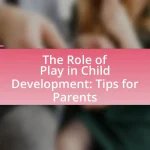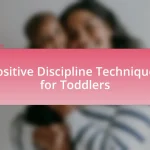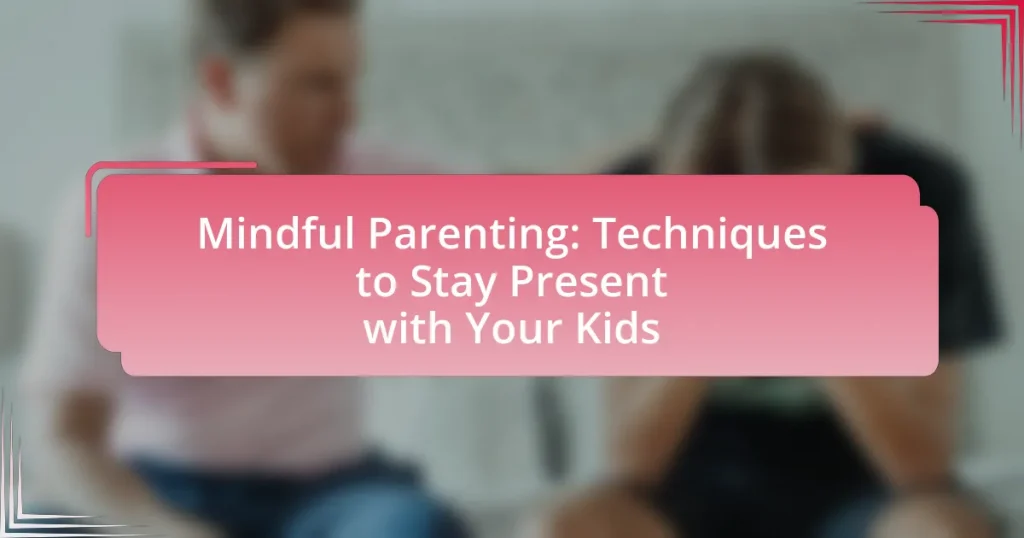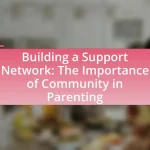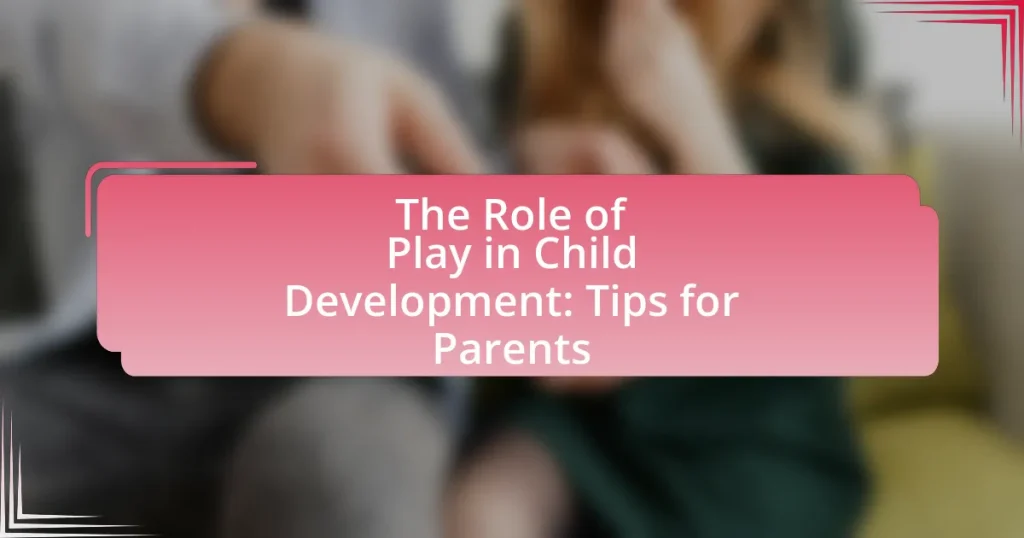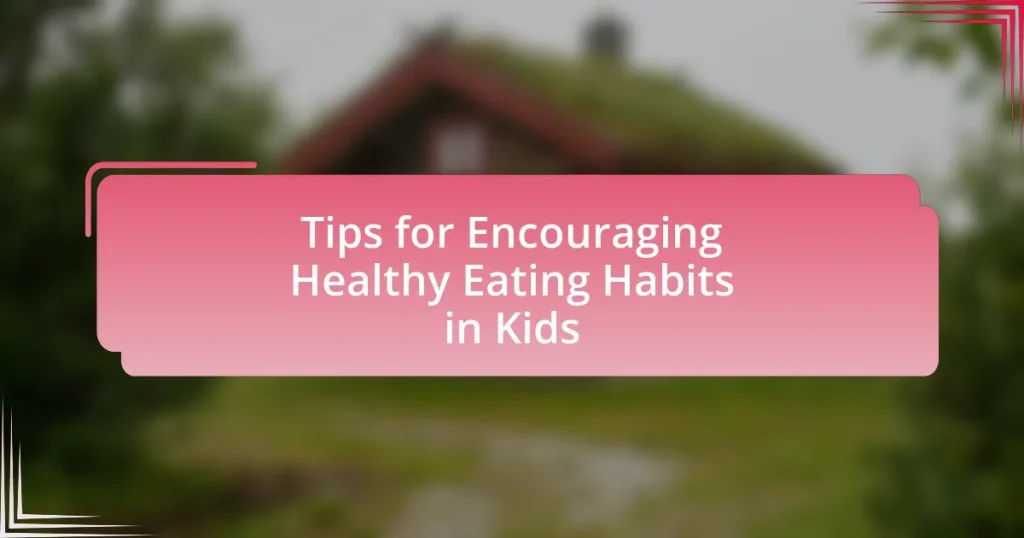Mindful parenting is the practice of being fully present and engaged with children, fostering deeper connections and emotional understanding. This approach emphasizes present-moment awareness, emotional regulation, and non-judgmental observation, contrasting with traditional parenting methods that often focus on discipline and control. Key techniques include active listening and creating a supportive environment, which enhance parent-child relationships and contribute to children’s emotional well-being. The article explores the principles, benefits, and practical strategies for implementing mindful parenting, as well as the challenges parents may face and how to overcome them. Research supports the positive impact of mindful parenting on family dynamics, emotional development, and overall satisfaction in parenting roles.
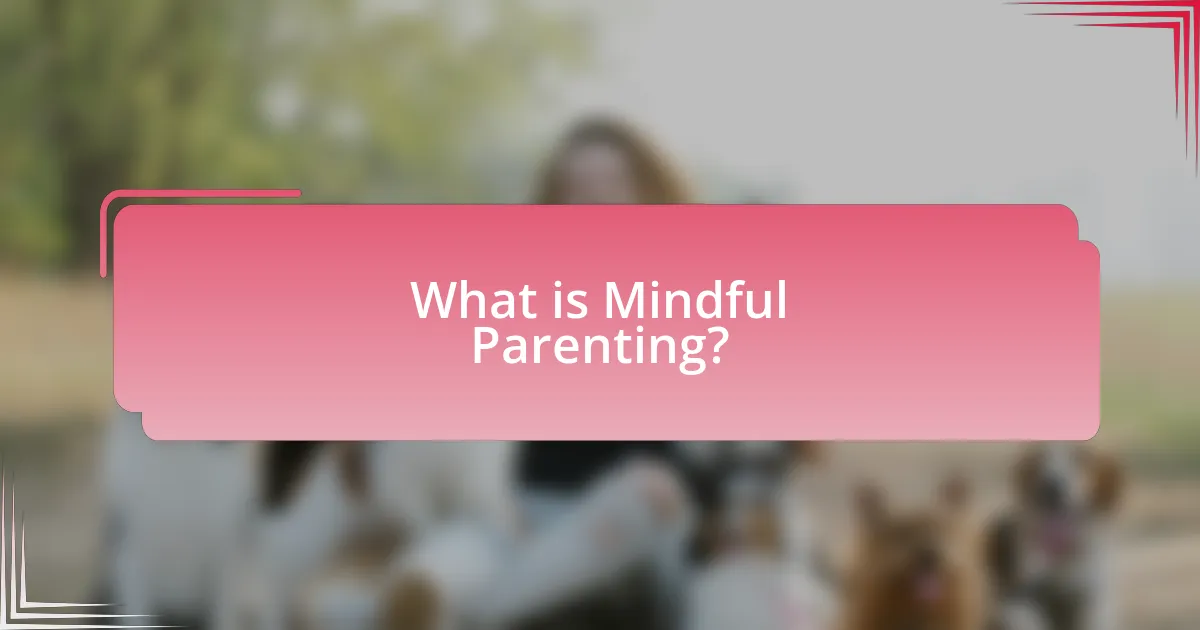
What is Mindful Parenting?
Mindful parenting is the practice of being fully present and engaged with one’s children, fostering a deeper connection and understanding. This approach encourages parents to observe their thoughts and feelings without judgment, allowing them to respond to their children’s needs with greater awareness and empathy. Research indicates that mindful parenting can lead to improved emotional regulation in both parents and children, enhancing overall family dynamics and reducing stress.
How does Mindful Parenting differ from traditional parenting approaches?
Mindful Parenting differs from traditional parenting approaches primarily in its emphasis on present-moment awareness and emotional regulation. While traditional parenting often focuses on discipline, control, and outcomes, Mindful Parenting encourages parents to be fully present with their children, fostering a deeper emotional connection and understanding. Research indicates that Mindful Parenting can lead to improved emotional well-being for both parents and children, as it promotes empathy, patience, and responsiveness, contrasting with the more reactive and often stress-driven nature of traditional methods.
What are the key principles of Mindful Parenting?
The key principles of Mindful Parenting include being present, non-judgmental awareness, and emotional regulation. Being present involves fully engaging with children in the moment, which fosters deeper connections and understanding. Non-judgmental awareness encourages parents to observe their thoughts and feelings without criticism, allowing for more compassionate responses to their children’s needs. Emotional regulation helps parents manage their own emotions, promoting a calm and supportive environment for children. Research indicates that these principles enhance parent-child relationships and contribute to children’s emotional well-being, as evidenced by studies showing improved behavioral outcomes in children of mindful parents.
Why is being present important in parenting?
Being present in parenting is crucial because it fosters emotional connection and supports children’s development. When parents engage fully with their children, they enhance communication, build trust, and create a secure environment that promotes emotional well-being. Research indicates that children who experience attentive parenting are more likely to develop strong social skills and emotional regulation. For instance, a study published in the Journal of Child Psychology and Psychiatry found that children with present and engaged parents exhibit lower levels of anxiety and better academic performance. Thus, being present directly influences a child’s overall growth and resilience.
What are the core techniques of Mindful Parenting?
The core techniques of Mindful Parenting include active listening, non-judgmental awareness, and emotional regulation. Active listening involves fully concentrating on what a child is saying, which fosters open communication and strengthens the parent-child bond. Non-judgmental awareness encourages parents to observe their thoughts and feelings without criticism, allowing them to respond thoughtfully rather than reactively. Emotional regulation helps parents manage their own emotions, enabling them to model healthy emotional responses for their children. Research indicates that these techniques can enhance parent-child relationships and improve children’s emotional well-being, as evidenced by studies showing that mindful parenting practices lead to lower levels of stress and increased emotional intelligence in children.
How can parents practice mindfulness in daily interactions?
Parents can practice mindfulness in daily interactions by actively engaging in the present moment during conversations and activities with their children. This involves maintaining eye contact, listening attentively without distractions, and responding thoughtfully rather than reactively. Research indicates that mindfulness can enhance emotional regulation and improve parent-child relationships, as shown in a study published in the Journal of Child and Family Studies, which found that parents who practiced mindfulness reported lower levels of stress and higher levels of satisfaction in their parenting roles. By incorporating these techniques, parents foster a more connected and supportive environment for their children.
What role does active listening play in Mindful Parenting?
Active listening is crucial in Mindful Parenting as it fosters deeper connections between parents and children. By fully engaging in conversations, parents demonstrate empathy and understanding, which enhances the child’s emotional security. Research indicates that active listening improves communication skills and emotional intelligence in children, leading to better social interactions and problem-solving abilities. This practice allows parents to respond thoughtfully rather than reactively, promoting a calm and supportive environment that is essential for mindful parenting.
What challenges do parents face in practicing Mindful Parenting?
Parents face several challenges in practicing Mindful Parenting, including time constraints, emotional regulation, and societal pressures. Time constraints often arise from busy schedules, making it difficult for parents to engage fully in the present moment with their children. Emotional regulation is another challenge, as parents may struggle to manage their own stress and emotions, which can hinder their ability to be present and attentive. Additionally, societal pressures, such as expectations to conform to certain parenting styles or to achieve specific milestones, can distract parents from the mindful approach they wish to adopt. These challenges can impede the effectiveness of Mindful Parenting, as research indicates that consistent practice is essential for fostering a deeper connection with children and enhancing their emotional well-being.
How can parents overcome distractions in their environment?
Parents can overcome distractions in their environment by creating a designated, clutter-free space for family interactions. This approach minimizes external stimuli and fosters focus on meaningful engagement. Research indicates that environments with fewer distractions enhance attention and communication, which is crucial for mindful parenting. For example, a study published in the Journal of Environmental Psychology found that organized spaces significantly improve cognitive performance and reduce stress, thereby allowing parents to be more present with their children.
What strategies can help parents manage stress while being present?
Parents can manage stress while being present by practicing mindfulness techniques, such as deep breathing, meditation, and setting aside dedicated time for self-care. Mindfulness techniques help parents focus on the present moment, reducing anxiety and enhancing emotional regulation. Research indicates that mindfulness can lower stress levels and improve overall well-being; for instance, a study published in the Journal of Child and Family Studies found that parents who engaged in mindfulness practices reported lower levels of stress and greater satisfaction in their parenting roles. Additionally, establishing a routine that includes regular breaks and engaging in physical activities can further alleviate stress, allowing parents to be more attentive and present with their children.
How can parents measure their progress in Mindful Parenting?
Parents can measure their progress in Mindful Parenting by regularly reflecting on their emotional responses and interactions with their children. This can be done through journaling about daily experiences, noting instances of mindful engagement versus reactive behavior. Research indicates that self-reflection enhances awareness and promotes emotional regulation, which are key components of mindfulness. Additionally, parents can utilize feedback from their children and observe changes in their children’s behavior and emotional well-being as indicators of their own mindfulness growth. Studies show that increased mindfulness in parents correlates with improved parent-child relationships and children’s emotional resilience.
What indicators show improvement in parent-child relationships?
Indicators that show improvement in parent-child relationships include increased communication, enhanced emotional connection, and greater conflict resolution skills. Increased communication is evidenced by more frequent and open discussions between parents and children, leading to a better understanding of each other’s perspectives. Enhanced emotional connection can be observed through expressions of affection, empathy, and support, which contribute to a stronger bond. Greater conflict resolution skills manifest as parents and children effectively addressing disagreements and finding mutually acceptable solutions, indicating a healthier dynamic. Research supports these indicators, showing that families who engage in mindful parenting practices report higher levels of satisfaction and connection in their relationships.
How can self-reflection enhance Mindful Parenting practices?
Self-reflection enhances Mindful Parenting practices by allowing parents to gain insight into their thoughts, emotions, and behaviors, which fosters greater awareness and intentionality in their interactions with children. This process helps parents identify triggers and patterns in their responses, enabling them to respond more thoughtfully rather than reactively. Research indicates that self-reflection can improve emotional regulation and empathy, which are crucial components of effective parenting. For instance, a study published in the Journal of Child and Family Studies found that parents who engage in self-reflection report higher levels of mindfulness and lower levels of stress, leading to more positive parenting outcomes.
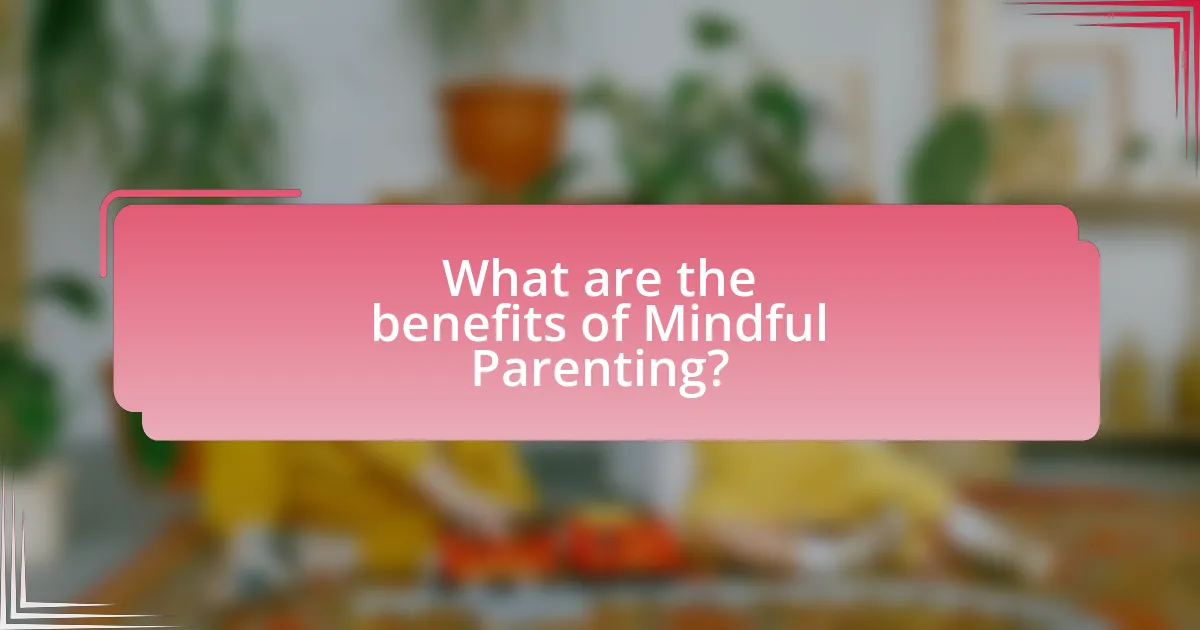
What are the benefits of Mindful Parenting?
Mindful parenting enhances emotional regulation and strengthens parent-child relationships. By practicing mindfulness, parents become more aware of their thoughts and feelings, which allows them to respond to their children with greater patience and empathy. Research indicates that mindful parenting can lead to reduced parental stress and improved mental health, as evidenced by a study published in the Journal of Child and Family Studies, which found that parents who engage in mindfulness practices report lower levels of anxiety and depression. Additionally, children of mindful parents often exhibit better emotional and behavioral outcomes, as they learn to model these skills from their caregivers.
How does Mindful Parenting impact children’s emotional development?
Mindful parenting significantly enhances children’s emotional development by fostering secure attachments and emotional regulation. When parents practice mindfulness, they become more attuned to their children’s emotional needs, which helps children feel understood and supported. Research indicates that children raised in mindful environments exhibit greater emotional intelligence, as they learn to recognize and manage their own emotions effectively. A study published in the Journal of Child Psychology and Psychiatry found that children whose parents engaged in mindful practices showed improved emotional regulation and lower levels of anxiety. This evidence underscores the positive correlation between mindful parenting and the emotional well-being of children.
What skills do children develop through Mindful Parenting?
Children develop emotional regulation, empathy, and improved attention skills through Mindful Parenting. Mindful Parenting encourages parents to model awareness and presence, which helps children learn to manage their emotions effectively, understand others’ feelings, and focus their attention. Research indicates that children exposed to mindful practices show enhanced emotional intelligence and social skills, as evidenced by studies demonstrating improved behavior and academic performance in environments that incorporate mindfulness techniques.
How does Mindful Parenting influence children’s behavior?
Mindful parenting significantly influences children’s behavior by fostering emotional regulation and enhancing parent-child communication. When parents practice mindfulness, they model self-awareness and emotional control, which children often emulate. Research indicates that children of mindful parents exhibit lower levels of anxiety and improved social skills, as they learn to navigate their emotions more effectively. A study published in the Journal of Child and Family Studies found that mindful parenting is associated with positive behavioral outcomes in children, including increased resilience and better conflict resolution skills. This evidence supports the notion that mindful parenting creates a nurturing environment that positively shapes children’s behavior.
What are the long-term effects of Mindful Parenting on family dynamics?
Mindful parenting positively influences family dynamics by fostering improved communication, emotional regulation, and stronger parent-child relationships. Research indicates that parents who practice mindfulness are more attuned to their children’s emotional needs, leading to a supportive environment that enhances children’s social and emotional development. A study published in the Journal of Child and Family Studies found that mindful parenting is associated with lower levels of parental stress and higher levels of parental satisfaction, which in turn contributes to a more harmonious family atmosphere. Additionally, children raised in mindful households tend to exhibit better emotional resilience and interpersonal skills, further solidifying positive family interactions over time.
How can Mindful Parenting foster stronger family bonds?
Mindful parenting fosters stronger family bonds by promoting emotional awareness and open communication among family members. When parents practice mindfulness, they become more attuned to their children’s feelings and needs, which enhances empathy and understanding within the family dynamic. Research indicates that families who engage in mindful practices experience improved relationships, as mindfulness encourages active listening and reduces reactive behaviors. For instance, a study published in the Journal of Family Psychology found that mindful parenting is associated with lower levels of parental stress and higher levels of family cohesion, demonstrating its effectiveness in strengthening familial connections.
What role does Mindful Parenting play in conflict resolution within families?
Mindful Parenting plays a crucial role in conflict resolution within families by fostering awareness and emotional regulation among parents and children. This approach encourages parents to remain present and attentive during conflicts, which helps in understanding the underlying emotions and needs of all family members involved. Research indicates that parents who practice mindfulness are more likely to respond to conflicts with empathy and patience, reducing the likelihood of escalation and promoting constructive dialogue. For instance, a study published in the Journal of Family Psychology found that mindful parenting is associated with lower levels of parental stress and improved parent-child relationships, which are essential for effective conflict resolution.
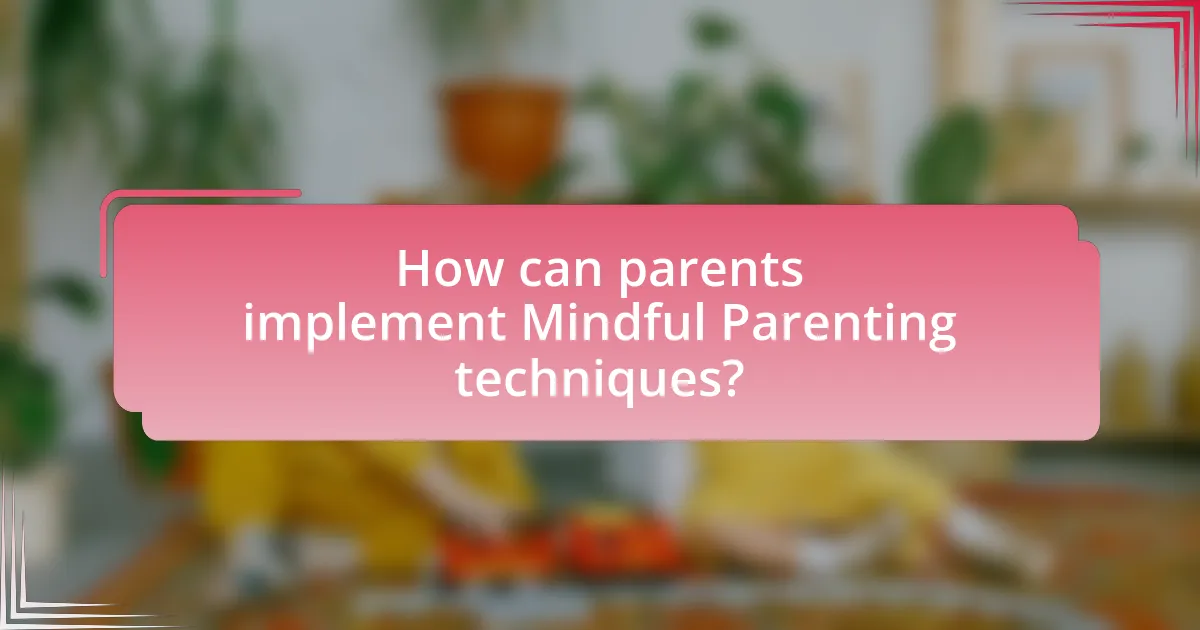
How can parents implement Mindful Parenting techniques?
Parents can implement Mindful Parenting techniques by practicing present-moment awareness during interactions with their children. This involves actively listening to their child’s thoughts and feelings without judgment, which fosters a deeper connection and understanding. Research indicates that mindfulness can enhance emotional regulation and reduce stress in both parents and children, as shown in a study published in the Journal of Child and Family Studies, where authors like Duncan et al. found that mindful parenting practices lead to improved parent-child relationships and better emotional outcomes for children. By incorporating techniques such as deep breathing, maintaining eye contact, and setting aside dedicated time for focused activities, parents can create a nurturing environment that promotes mindfulness in daily interactions.
What practical steps can parents take to start practicing mindfulness?
Parents can start practicing mindfulness by incorporating short, focused breathing exercises into their daily routine. For instance, dedicating five minutes each morning to deep breathing can help parents center themselves and cultivate awareness. Research indicates that mindfulness practices, such as focused breathing, can reduce stress and improve emotional regulation, which is essential for effective parenting. Additionally, parents can engage in mindful observation during everyday activities, such as eating meals or playing with their children, by fully concentrating on the experience without distractions. This practice enhances connection and presence, fostering a more mindful parenting approach.
How can parents create a mindful environment at home?
Parents can create a mindful environment at home by incorporating daily mindfulness practices into family routines. This can include setting aside time for family meditation, encouraging open communication about feelings, and practicing gratitude together. Research indicates that mindfulness can enhance emotional regulation and reduce stress, which supports healthier family dynamics. For instance, a study published in the Journal of Child and Family Studies found that families who practiced mindfulness reported improved relationships and communication. By fostering a space where mindfulness is prioritized, parents can help their children develop essential life skills and emotional awareness.
What daily routines can incorporate mindfulness with children?
Daily routines that can incorporate mindfulness with children include mindful eating, where families focus on the taste, texture, and aroma of their food without distractions. This practice encourages children to appreciate their meals and fosters gratitude. Another routine is mindful walking, where families take walks together, paying attention to their surroundings, such as the sounds of nature or the feeling of the ground beneath their feet. Additionally, bedtime routines can include mindfulness activities like deep breathing exercises or guided imagery, helping children relax and reflect on their day. Research indicates that these practices can enhance emotional regulation and reduce anxiety in children, supporting their overall well-being.
What resources are available for parents interested in Mindful Parenting?
Parents interested in Mindful Parenting can access a variety of resources, including books, online courses, workshops, and mobile applications. Notable books such as “The Whole-Brain Child” by Daniel J. Siegel and Tina Payne Bryson provide insights into integrating mindfulness into parenting. Online platforms like Mindful Schools offer structured courses that teach mindfulness techniques specifically for parents. Additionally, workshops led by certified mindfulness instructors can provide hands-on experience and community support. Mobile applications like Headspace and Calm also feature sections dedicated to mindfulness practices for parents, helping them cultivate presence and awareness in their parenting journey.
What books and courses can enhance understanding of Mindful Parenting?
Books that can enhance understanding of Mindful Parenting include “The Whole-Brain Child” by Daniel J. Siegel and Tina Payne Bryson, which provides insights into child development and mindfulness techniques. Another significant book is “Mindful Parenting” by Kristen Race, which offers practical strategies for integrating mindfulness into parenting. Courses such as “Mindful Parenting: A Course for Parents” offered by the Mindful Schools organization teach parents how to apply mindfulness practices in their daily interactions with children. Additionally, the “Mindful Parenting” course by the Center for Mindfulness in Medicine, Health Care, and Society provides evidence-based techniques to foster a mindful approach to parenting. These resources are validated by research indicating that mindfulness can improve parent-child relationships and enhance emotional regulation in both parents and children.
How can support groups aid in the practice of Mindful Parenting?
Support groups can significantly aid in the practice of Mindful Parenting by providing a platform for sharing experiences and strategies among parents. These groups foster a sense of community, allowing parents to discuss challenges and successes in their mindful parenting journey, which can enhance their understanding and application of mindfulness techniques. Research indicates that social support is linked to improved mental health and parenting practices, as parents who engage with support groups often report lower stress levels and increased emotional regulation. This collective sharing of mindfulness practices and coping strategies can lead to more effective parenting and a greater ability to stay present with children.
What are some tips for maintaining mindfulness in parenting?
To maintain mindfulness in parenting, practice being fully present during interactions with your children. This can be achieved by setting aside distractions, such as phones or television, and focusing solely on the moment. Engaging in deep breathing exercises before or during parenting moments can help center your thoughts and emotions, allowing for a more attentive and calm approach. Research indicates that parents who practice mindfulness report lower stress levels and improved relationships with their children, as mindfulness fosters better emotional regulation and communication skills.
How can parents remind themselves to stay present throughout the day?
Parents can remind themselves to stay present throughout the day by setting specific cues or reminders, such as using timers or sticky notes in visible places. These reminders can prompt parents to pause and engage fully with their children, fostering mindfulness. Research indicates that mindfulness practices, such as brief moments of focused breathing or gratitude, can enhance emotional connection and reduce stress, making it easier for parents to remain attentive. For instance, a study published in the journal “Mindfulness” found that regular mindfulness practice can significantly improve parental presence and responsiveness, leading to better outcomes for children.
What are common pitfalls to avoid in Mindful Parenting?
Common pitfalls to avoid in Mindful Parenting include multitasking during interactions, reacting impulsively to children’s behavior, and neglecting self-care. Multitasking can lead to a lack of genuine connection, as parents may miss important cues from their children. Reacting impulsively can escalate conflicts and hinder effective communication, while neglecting self-care can result in burnout, making it difficult for parents to be present and attentive. Research indicates that parents who practice mindfulness report better emotional regulation and improved relationships with their children, highlighting the importance of avoiding these pitfalls for effective mindful parenting.

